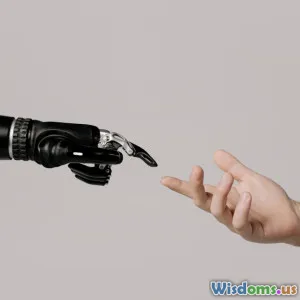
Science Fiction's Role in Tech Ethics
8 min read Explore how science fiction shapes ethical discussions around emerging technologies and guides responsible innovation. (0 Reviews)
Science Fiction's Role in Tech Ethics: Guiding the Future of Innovation
Introduction
Imagine a world where artificial intelligence controls every facet of daily life or where genetic engineering allows humans to design their offspring. These scenarios may sound like pages ripped from futuristic novels, but as technology accelerates, they inch closer to reality. In this context, science fiction emerges not merely as entertainment but as a profound catalyst in shaping ethical perspectives on technology. It compels us to confront the moral questions posed by innovation long before they become societal crises, offering a speculative space to experiment with consequences and choices.
The Intersection of Imagination and Ethics
Science fiction serves as a cultural mirror and a prophetic lens. Writers like Isaac Asimov and Philip K. Dick envisioned worlds where technology's ramifications reveal profound ethical questions. Consider Asimov's Three Laws of Robotics, which have permeated discussions on artificial intelligence (AI), framing fundamental principles about robot behavior and safety. These fictional laws have transcended into serious academic and corporate conversations about AI ethics, illustrating how imaginative works can seed real-world policy and design.
AI and the Ethical Quandaries Explored through Fiction
AI is possibly the most discussed technology in ethical debates today. Science fiction narratives such as Blade Runner and Ex Machina profoundly explore the moral status of artificial sentience. They raise questions about identity, consciousness, and rights for machines—topics that academics and technologists actively explore as AI capabilities improve.
For example, the idea of robot autonomy challenges liability and justice frameworks. Who is responsible for a self-driving car’s accident? These ethical ambiguities were dramatized decades ago in sci-fi works, allowing society to engage with the dilemmas before widespread adoption.
Privacy, Surveillance, and Dystopian Warnings
Privacy erosion is a pressing ethical concern amid mass data collection and surveillance technologies. Science fiction staples like George Orwell’s 1984 and more recent works like Black Mirror provide cautionary tales about state and corporate overreach. By portraying dystopian futures driven by surveillance abuses, these narratives crystallize the stakes involved and rally public awareness.
Studies suggest that fictional depictions influence public attitudes toward technology. For instance, a 2016 survey found that exposure to dystopian sci-fi increased skepticism about government surveillance, illustrating the genre’s role in ethical education and policy pressure.
Bioethics and Human Enhancement in Sci-Fi
Advances in biotechnology, including CRISPR gene editing and neuro-enhancement, were fictional fodder long before entering laboratories. Mary Shelley’s Frankenstein introduced ethical anxieties about creating life, raising questions that morph into modern debates on designer babies and synthetic biology.
Science fiction often wrestles with the moral limits of human enhancement. Works like Gattaca portray societies stratified by genetic manipulation, warning against new forms of inequality and discrimination. This shapes public discourse, encouraging lawmakers and scientists to consider the broader social implications of emerging biotechnologies.
Science Fiction as an Ethical Sandbox for Innovators
Beyond public influence, science fiction functions as an ‘ethical sandbox’ for technologists. Engineers and inventors use speculative fiction as thought experiments to foresee unintended consequences.
Companies like Google and OpenAI often reference sci-fi when discussing responsible AI development. For example, Google’s ethical AI principles reflect concerns popularized in fiction, such as fairness, safety, and avoidance of surveillance misuse. Through envisioning worst-case scenarios in sci-fi stories, tech creators are better equipped to preempt ethical pitfalls.
Promoting Empathy and Diverse Perspectives
Science fiction also nurtures empathy by immersing readers and viewers in the experiences of others, including AI entities or enhanced humans. This broadening of perspective is crucial for ethical deliberation, enabling stakeholders to grapple with complexities beyond their own reality.
Moreover, contemporary science fiction increasingly includes diverse voices—from different cultures, genders, and identities—adding richness to ethical conversations. Authors like N.K. Jemisin and Ted Chiang offer fresh viewpoints, reinforcing the idea that technology impacts everyone and ethical frameworks must be inclusive.
Challenges and Criticisms
While science fiction is invaluable, it is not without limitations. Some critics argue that sci-fi sometimes sensationalizes technology, fueling irrational fears or utopian thinking that complicate reasonable policy-making. Additionally, because many depictions are speculative or fictionalized, there is a risk that the public may misinterpret potentials and risks.
Balancing imagination with grounded foresight is essential. Interdisciplinary collaboration among ethicists, scientists, and the sci-fi community can mitigate distortions and maximize benefits.
Conclusion: A Call to Intertwine Fiction and Ethics
Science fiction’s enduring value lies in its ability to animate the abstract ethics of technology with human stories. As innovations like AI, robotics, and biotechnology shape our futures at breakneck speed, relying solely on after-the-fact regulation or abstract philosophy is insufficient.
Integrating science fiction into ethical discourse enriches understanding, stimulates dialogue, and inspires preemptive thoughtful innovation. The genre’s imaginative power should be harnessed as a tool—for policymakers to craft wiser technology governance and for society to engage critically with the ethical dimensions of progress.
By celebrating and actively involving science fiction in these conversations, we stand better equipped to build futures that honor both technological possibilities and human values.
“Science fiction remains an unparalleled beacon for technology ethics—challenging us to imagine not just what we can build, but what we should.”
References
- Asimov, Isaac. I, Robot.
- Orwell, George. 1984.
- Jemisin, N.K. The Broken Earth Trilogy.
- 2016 Survey on Public Attitudes Toward Surveillance (Pew Research Center)
- Google AI Principles (2018)
- Chiang, Ted. Stories of Your Life and Others.
- Smith, John. "Science Fiction as a Precursor to Technology Ethics," Journal of Ethics and Emerging Technologies, 2021.
Rate the Post
User Reviews
Popular Posts





















